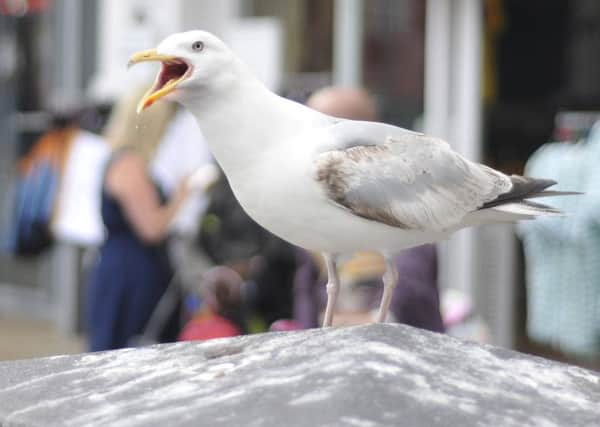Country & Coast: What to do about the gulls who prey on our snacks...


These birds are not the sinister black crows of the horror movie, though, but innocent-looking white seagulls, and they are behaving in a decidedly unangelic manner.
Their keening conjures up the atmosphere of idyllic sun-kissed beaches at the start of the BBC’s Desert Island Discs, but from Whitby to Withernsea there is nothing romantic about the way they dive bomb pensioners and have a go at cats and dogs.
Advertisement
Hide AdAdvertisement
Hide AdThey steal sandwiches from the hands of children, snatch fish and chips from mum and dad, and poo with total lack of concern for whoever or whatever is beneath them.
These stories usually appear in summer, perhaps as a perennial “silly season” yarn when not much else is happening. One newspaper even carried pictures of a woman pegging out washing in her garden while wearing a stainless steel colander on her head to protect her from savage pecks. But of course, summer’s when most people visit the coast and potentially fall prey to flocks of greedy gulls.
In landlocked towns like Harrogate the problem is not gulls but pigeons, and there is a suggestion they could somehow be put on the pill to stop them breeding.
Pigeons, the comedian and film director Woody Allen said in Stardust Memories, are “rats with wings”. Well, that description probably fits seagulls in places like Scarborough, where herring gulls have been nesting on roofs since the 1960s.
Advertisement
Hide AdAdvertisement
Hide AdAs a birdwatcher, I perhaps see gulls differently from others. They are herring gulls, usually, and while they seem to be pretty ubiquitous it is actually the case that six years ago the species was placed on the UK’s Red List of birds of conservation concern.
While our summer population is put at 130,000 pairs, there has been a marked decline over the past five decades.
Despite being protected by the Wildlife and Countryside Act 1981 they are still on a downward slide, so it is hard to know how the problem can be addressed.
Local culls of the birds, even if Natural England granted a license and risked the undoubted controversy, would probably have little effect, their places taken by birds from elsewhere on the coast.
Advertisement
Hide AdAdvertisement
Hide AdScarborough Council is investigating ways of dealing with the issue and has undergone a public consultation exercise. One novel idea to surface is lacing fish and chips with a non-lethal liquid gulls are known to dislike and leaving out as bait, the theory being that they would lose their appetite for Scarborough’s most popular fast food. Somehow, though, I think they would end up developing a taste for it, just like the grey squirrels that visit my garden feeder have decided to ignore the cayenne pepper I sprinkled over the nuts.
With herring gulls clearly vulnerable, the fear is they might one day go the way of other once-common birds like house sparrows.
I expect to see stories of rapacious gulls running for many summers to come.